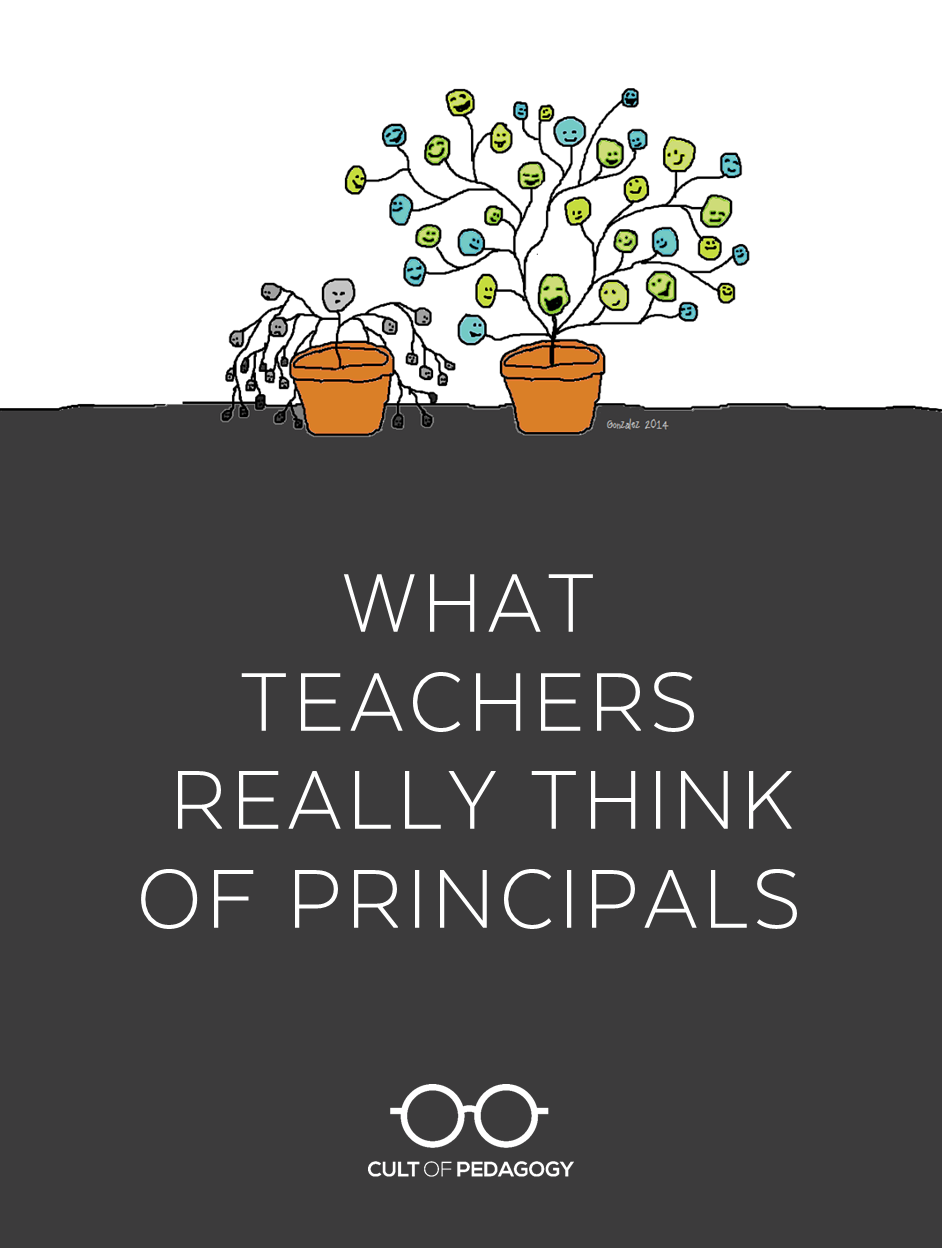
Last month, I had a hunch about something. I noticed that when I talked to teachers about their job satisfaction, the thing that seemed to make the biggest difference from school to school was the principal. So I decided to conduct a survey, asking teachers for more specifics. To reach more respondents, I also wrote a guest piece on Anthony Cody’s Education Week blog.
The results are in. Eighty-five teachers from over 20 U.S. states (and at least two countries outside the U.S.) took the time to provide detailed descriptions of the specific things their administrators do to make their jobs wonderful, and the things they do to make them miserable.
Key Points
Overall, the results ran the full spectrum between teachers who respect and admire their administrators, and those who can’t stand them. A few specific issues came up over and over again. In no particular order, they are:
Time in the Classroom. When asked what they would like more of, even those who felt good about their principals said they’d like them to spend more time in their classrooms. “He tells me I’m one of his best teachers, but he’s never really seen me teach,” wrote one person. “I think this is based more on the fact that I don’t cause a lot of trouble. It would be nice if he actually knew more about the nuts and bolts of teaching — his opinion would mean more to me.”
Another teacher felt their administrator’s effectiveness was built on time in their classroom: “She has spent enough time in my room to understand my classroom management style and the systems I have in place for rewarding and disciplining students. She trusts me because she has taken the time to get to know me, how I teach, my students, and any pertinent ongoing issues.”
Respect for Teachers’ Time. Not surprisingly, many teachers reported not having enough time to fulfill their job requirements. In some cases, administrators helped to ease this problem: “My admin never expected more than we could do,” said one teacher. “I think he thought many of us worked too hard and tried to make teaching easier for us.” In many other cases, however, principals did things that made time constraints worse. “Many of our so-called planning periods are used just to have yet another meeting or to catch up on work that keeps getting piled on us. I literally use none of my planning for actual planning. None.”
How organized a principal is makes a difference, too. Teacher after teacher wrote about mandatory tasks that were handed down at the last minute, requiring them to find time in already squeezed schedules. “He will often let deadlines slip up on him, then expect us to make up for the mistake by submitting work in a very short time.”
In many cases, teachers pointed to a lack of administrator awareness of just how much time teachers spent on schoolwork. “Despite being in the school when she is not and despite working many hours (sometimes staying up all night) at home, she has told me several times that she needs teachers who are willing to put the time in to have nice bulletin boards.”
Seeking Teacher Input. Although some respondents described administrators who include them in decision-making, many reported just the opposite. When asked how often their administrators sought teacher input on decisions that would impact the work teachers do, 45 percent said “Never” or “Almost Never.” One teacher wrote, “He has a handful of teachers who are training to one day become administrators. He consults with them regularly. The rest of us? No.”
When it comes to academic decisions, many teachers feel their expertise is ignored. “People who have no academic background in developmental reading and/or have never taught struggling readers have NO BUSINESS determining how children are taught to read,” one teacher wrote. “This is frustrating for staff and devastating for children. Admit when you don’t know something and let those who do understand the issue to determine how it is dealt with. Teachers will have much more buy-in (a critical component for change) if we are consulted and trusted as experts.”
At other times, teacher expertise is met with hostility: “I have far more education and teaching experience than my principal. She is threatened by my expertise and openly hostile to hearing opinions that differ from her own.”
Some respondents felt that although teachers were given some opportunity for input, the timing was off. “Agendas are often provided the day of or the day before meetings. This is a start in the right direction. However, the agendas often just have general topics listed. If relevant questions for the staff were also listed, we could prepare answers, suggestions, or even research and student work as needed.”
School Culture. One of the most dramatic responses was to question 8, which asked how well administrators cultivated positive relationships between faculty members. Almost half of respondents answered “Poor” (17%) or “Very Poor” (32%). Another 26% rated their administrators as merely “OK” in this category.
One big factor that seems to contribute to these numbers is the quality of communication between administrators and their teachers. Gossip, manipulation, and playing favorites came up frequently in the comments. “He pits faculty members against one another rather than having open conversations,” said one respondent. “That creates an atmosphere of distrust.”
In other cases, administrators created a competitive atmosphere openly, comparing teachers’ performance during faculty meetings. “I don’t want to be compared to others,” said one teacher. “I just want to be the best that I can be.”
Summing up their school culture, one teacher simply wrote, “Everyone, including students, is terrified to go to her with anything.”
Where Do We Go From Here?
I will be the first to say that 85 respondents is not exactly a huge sample of teachers. This was an independently conducted survey with no budget, taken over just a few weeks, using a free online survey platform. With that said, I think these results can serve as a springboard for future action:
Principals can use these results to reflect on their own practice. Whether a member of your staff actually took the survey is irrelevant, because these stories could have been told about many, many principals walking the halls of our schools right this minute. And regardless of what you believe about your performance as an administrator, this survey makes one thing clear: Your teachers aren’t telling you everything. When asked whether they felt comfortable going to their administrator with a complaint about something the administrator had done, a full 70 percent of respondents said they did not. If you want to, and are brave enough to learn more about how your faculty really feels about you, give them the survey yourself. And do it in a way that guarantees anonymity, with no fear of retribution for honest answers. (To make this easier, download a blank copy of our survey, which you can modify for your own needs and distribute to your staff. See link at the bottom of this article.)
Beyond the individual principal, these results could prompt a more robust study from a university or other institution interested in discovering what really impacts the work of teachers. Because this survey was voluntary, I think it naturally attracted more teachers who had negative experiences. This is not to discount those, but there is more to be learned about what good administrators are doing right.
Finally, more public attention needs to be given to the day-to-day skills of principals. The vast majority of reform focuses on teacher quality, but I see almost no public discourse on the specifics of what makes an effective principal. If nothing else, my hope is that this survey will alert readers to the incredible impact a principal can make on a teacher, and that doing the right thing can be as simple as paying attention. “Open your eyes and look at how hard people are working,” writes one teacher. “There are heroic things going on in classrooms all over your building. Have a little humility and NOTICE the good that is being done for children.” ♥
Read the full report here: Survey on School Administration
Join my mailing list and get weekly tips, tools, and inspiration — in quick, bite-sized packages — all geared toward making your teaching more effective and joyful. To thank you, I’ll send you a free copy of my new e-booklet, 20 Ways to Cut Your Grading Time in Half. I look forward to getting to know you better!




Amazing. There were several responses that were so similar to my own that I thought that I had written them. Reading this also made me sad and defeated all over again about having to leave my last position. Hope that this survey opens some administrators’ eyes.
so true
wonderful
Excellent post backed up with solid survey methodology.
That whole report was a fascinating read. It kills me to know that there are such terrible administrators out there, making the jobs so much more miserable than they have to be. Great survey!
I would be interested to see what the sizes of the schools were where the survey respondents were from. I’m involved in a relatively small school (just over 400 children) ages 5 to 11, and our principal seems to tick all the boxes from your survey above. However in larger schools, they would have to use a ‘management’ type structure as there is only one principal, and they could not be everywhere.
The way I see it, a school is like a business. For it to be successful the principal must be succession planning, and leadership talent identified and nurtured.
I think any demographic information on the respondents would have made these results much more useful — income level of school district, state or country, and yes, school size. Since I had a limited number of questions (free survey platform), and because I wanted respondents to not worry about including any identifying information (several people privately expressed BIG concerns about this), I left those kinds of questions out. It may be useful to conduct another, quicker survey down the line that looks at the connection between school size and principal-teacher relationship. I would bet there’s a strong correlation.
It seems that the job description for a principal is really way too big — we want them to be strong in so many areas: instruction, the management of people, and the business end of running a school. These are entirely different skill sets, and I suspect that the answer to getting better qualities from our leaders is to diversify those roles more. I can imagine a scenario where the school is run by a team of people — maybe three — who all have equal final say in major decisions. One would be strong in the financial end, one would handle the HR-type stuff, and the third would be very strong in pedagogy. If this group partnered with an elected board of 5-6 teachers who advised them on major decisions, a school could really make use of everyone’s strengths and not leave the quality of the school up to one person at the top.
I agree that we expect our principles to be experts in everything, and that leads to a huge investment of time from them to get it all done. They are so important to the success (or otherwise) of the schools, and we need to make sure we get a good supply of future leaders.
Thanks for the survey – it made very interesting reading!
Great post. Might I suggest another? I would love to see a survey/post on “Administration in the Classroom – at ALL LEVELS” create effective change in their schools. Do teachers believe if Superintendents/Principals/VPs, were required to step into the teaching role of the most difficult classrooms under their care (for a few days throughout the year), to SHOW their teachers how to be effective under the expectations placed upon us daily, would they then would lead more effectively? [I believe their leadership would be based on factual needs & practices – not just educational theories. Today’s classroom demands are swiftly changing. Our leaders must be in the trenches with us, solving real-life problems, with first-hand experience. I know they are busy – we are too. We are told to understand our students’ needs better to teach better. I believe their presence and experience in the classroom would revolutionize education on all levels.] -What do other teachers think of this?
Reading this made me think how how personal Integrity is crucial for positive relationships. Nice post Ms G.
Thank you for the post. I am an Assistant Principal in Southern California and I found the data to be very telling. I will use this data to reflect on my own practice and make appropriate adjustments. Time in the classroom is something I value immensely. The pay off is either staying later at work or taking work home late in the night. It is a balance but I am determined to become more of an instructional leader, listen more to my teachers, and build positive relationships. Thank you again for the post.
Tim, Asst. Principal. What do you think of my above suggestion of leaders taking the wheel of a classroom to “show” us & keeping fresh that real-life experience? I don’t think this would be easy in any way, but Wow! I would have tremendous respect for someone who filled my shoes in such a pertinent way and lead accordingly. Especially district office leaders.
I wrote my dissertation surrounding the magnitude of the principal role, challenges, and personal experiences of new principals. I invite you to search it through Pro Quest and let me know your thoughts! It was just published this fall. I can also email you a pdf if you are interested! You will find some great research within my study!
WITH GREAT POWER COMES GREAT RESPONSIBILITY: NAVIGATING THROUGH YEAR ONE OF THE PRINCIPALSHIP
I would love to have the pdf for future reflection. Please send if you are still taking requests.
THIS is the exact reason I went back to get my masters in admin. We have an administrator who is doing a less than fabulous job and they hired him to take the job I wanted as an admin. I don’t understand why admin that don’t have backbones continue to keep their jobs!
Twice, I had administrators write terrible performance reviews without ever having observed my teaching.
I appreciate the input gathered about administration. A principal who is controlling, targets staff, and just wants to make decisions without teacher input certainly cannot be called a leader. I have had 1-2 of those in my many years of education. However…there are several administrators that are great leaders who bend over backwards for staff. Most of my staff know that I would do anything for them including teach their classroom. (For teacher appreciation week, I offered to come into everyone’s classroom and teach a lesson on bullying so that they had that extra hour to work). We have a great mutual respect and they know I was just in the classroom for the last 20 years. The difficult part are those small handful of staff that will never be satisfied with anything I do or any decision that I make and fail to realize that I am human. Like other administrators, I make mistakes, I flub up decisions, I don’t handle a situation like they may want. But good school leaders in this country certainly outweigh the bad by far.
I know how hard teachers work. I know the disrespect they receive from students. I understand the time they put into their job at school and at home. Not every school leader is approachable, but there are SO many that are. I’ll be honest, administrators certainly don’t do this job for the money (I have teachers that make more than I do), but so many of them do it because they love their students and just like staff, want to make a difference! So please, give the administrators a chance and remember that they aren’t all bad AND they make mistakes, just like everyone does!
Thanks for your comments. You’re not alone in recognizing the range of experiences teachers have in terms of their relationships with admin. It’s a tough job, no matter what side of the desk you’re on!
Hello,
Although this is an older post, would you be willing to share your survey questions with me? I am working on my dissertation and am planning (at least at this current moment) to research leadership/principal behaviors that retain teachers – specifically have retained them through COVID. Any sharing?
Hi, Trisha! If you scroll down to the end of the post, Jenn has linked the full report, which includes the survey questions. Good luck with your dissertation!